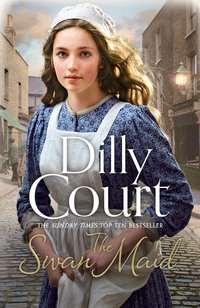
Полная версия
Nettie’s Secret
‘I’m sorry,’ she said breathlessly as she attempted to stand unaided, but the ship yawed and she would have fallen if he had not grasped her firmly.
‘Well, then. I didn’t expect to find you here, Miss Carroll. Least of all being thrown into my arms.’
Nettie reached out and grabbed the ship’s rail. ‘Duke!’
‘Hush! Not so loud, Nettie, my dear. I’m incognito for reasons that you will appreciate.’
‘You’re on the run from the police and so is my pa, thanks to you.’
‘Now, now, that’s not fair. I didn’t force Robert to work for me. He was eager to earn money and I put him in the way of several decent commissions. I was informed on by a man who has a personal grudge against me and will stop at nothing until he sees me ruined.’
‘What you did was illegal,’ Nettie countered. ‘You used my father’s talents to make money for yourself.’
‘That, my dear, is business.’ He eyed her curiously. ‘What I don’t understand is why you chose to accompany him. Haven’t you any relations who would take you in and look after you?’
‘I’m not a child, Duke.’
‘Quite.’ He shrugged and turned away. ‘Well, good luck. That’s all I can say.’ He turned back to give her a quizzical smile. ‘But what will you do when the money runs out? Will you beg on the streets or sell yourself in order to keep your feckless father in comfort?’
‘Neither,’ Nettie said angrily. ‘We’ll find a way.’
He hesitated, frowning. ‘I suppose I do bear some responsibility for what has happened to you, although it pains me to say so. I must be getting soft in my old age.’
Suddenly curious, Nettie gave him a searching look. ‘You can’t be more than thirty-five.’
‘As a matter of fact, I’m thirty-four. Riotous living must be starting to mar my good looks.’ He put his hand in his breast pocket and took out a silver card case. He flicked it open and produced a gilt-edged visiting card. ‘This is the one I use when in Paris. You will see that I go by the name Gaillard when in France. I have many identities, Nettie, but if you are in trouble you can find me at this address. I might even have work for your father, if he’s so minded.’ Duke walked away, adapting to the movement of the ship as if he had spent his life at sea.
Nettie tossed the card overboard, but the wind caught it and deposited it at her feet. Despite her misgivings, she bent down, picked it up and tucked it in her reticule. Duke Dexter was on the run just the same as they were, but Marc Gaillard, the Parisian art dealer, might be useful, if they were desperate.
She felt a sudden change in the tone of the ship’s engine and she caught sight of land. She hurried back to the saloon to tell her father and Byron that they were nearing Calais, but she would keep Duke’s presence on board a secret.
Robert had changed his mind about staying the night in Calais, or perhaps Byron had changed it for him, but in the end they took the train to Paris. It was an uneventful and reasonably comfortable journey, and when they reached their destination Robert insisted on hiring a fiacre to take them to Montmartre, where he was convinced he would meet like-minded people and his talent would be recognised. He seemed to be happy to sit back and allow Byron to do all the talking, and Nettie was quietly impressed by her friend’s fluent French as he told the cab driver where they wanted to go. They were dropped off in a quiet backstreet close to a small square filled with flower stalls, fruit sellers and cafés where people sat at small tables in the shade of trees, which were bursting into leaf.
Byron paid the driver. ‘He says we can get cheap lodgings here,’ he said as the fiacre pulled away from the kerb.
Robert held out his arms, smiling as he took deep breaths of the air scented with French tobacco, wine and garlic, which barely masked the smell of drains and overflowing privies.
‘I am in my spiritual home,’ he said gleefully. ‘It is here, in Paris, that I will do my best work. I was duped by Duke Dexter, but now I am free from his demands, and I will start afresh.’
Nettie said nothing, but the cab had driven along the street named on Duke’s visiting card and she was uneasy. The last thing she wanted was for her father to get involved with the man who had led him into crime in the first place. It would be all too easy for him to go that way again when their money ran out, but she decided to talk it over with Byron at the first opportunity. Their most pressing need was for somewhere to stay, and Byron was making enquiries at the door of a house with a sign in the window advertising vacancies.
‘Byron is a handy chap to have around,’ Robert said grudgingly. ‘I wouldn’t have chosen him as a travelling companion, but he’s proving useful.’
‘We would be in a pickle without him, Pa. I can’t speak a word of French, and neither can you.’
‘I know how to communicate with people, Nettie. But we’ll put up with him for a while and then he can go on his way. I don’t want you getting too close to a fellow who has little or no prospects.’
Nettie stared at him, speechless. It was on the tip of her tongue to remind Pa that he was the fugitive from justice and Byron was here to help them, but she knew it would be futile. Once her father had an idea in his head it was almost impossible to make him see reason.
‘She has two rooms,’ Byron said as he hurried back to them. ‘They’re in the attic, but she says there’s another couple who are interested so we have to give her an answer right away.’
‘The woman is probably bluffing.’ Robert was about to walk away when Nettie caught him by the sleeve.
‘It’s getting late, Pa. We need to have somewhere to sleep.’ She turned to Byron. ‘How much rent is she asking?’
‘About twice as much as we were paying Ma Burton.’
‘Daylight robbery,’ Robert said, frowning. ‘We’ll look elsewhere.’
Nettie tightened her grip on her father’s arm. ‘Think about it, Pa. If we can’t find somewhere quickly we’ll have to pay for three hotel rooms. What would that cost?’
‘All right.’ Robert gave in graciously. ‘We’ll take the rooms for a week, and in the meantime we can look for something more reasonable.’ He picked up the bag containing his paints and brushes, leaving Byron to carry his case. ‘Lead on. I want to see what you’ve let us in for, Mr Horton.’
‘I’d remind you that you are the one fleeing the law, Mr Carroll. And since you cannot speak the language you are at a definite disadvantage.’ Byron dropped the suitcase at Robert’s feet. ‘I came as a friend, not as a servant.’ He took Nettie’s valise from her hand and led the way into the house.
‘You asked for that, Pa,’ Nettie said softly. ‘Don’t underestimate Byron, and remember that we need him if we’re to get on in this country.’
‘When I want your opinion I’ll ask for it.’ Robert stomped past her and followed the landlady up the stairs.
Madame was not a young woman, but she was obviously used to negotiating five flights of steep stairs and she was barely out of breath when they reached the attics. Robert, however, was red in the face and gasping for breath. Nettie’s knees were aching, but she could see that her father was genuinely suffering.
Madame unlocked the door and ushered them into the room. She addressed Byron, speaking rapidly and waving her hands about as if conducting an invisible orchestra.
‘She wants a week’s rent in advance and she’s put the price up,’ Byron said hastily. ‘I think she suspects something, so it might be as well to pay her and keep her happy.’
‘Blackmail is the same in any language.’ Robert took a leather pouch from his pocket and handed it to Byron. ‘Pay the old hag, but we won’t be staying here for long. That I promise you.’ He glanced around the low-ceilinged room with bare floorboards and the minimum of furniture.
All smiles now, Madame left them, closing the door behind her.
‘I get the feeling she’s had the best of that deal,’ Byron said grimly.
Nettie examined the iron bed with a thin flock-filled mattress, and the washstand with a cracked basin and a jug with a chipped handle. A single chair and a low table were the only other items of furniture, and it was much the same in the larger room, although it boasted a double bed and two chairs. She was quick to notice that one of them had a broken leg.
‘How am I supposed to work here?’ Robert demanded. ‘I suppose I will have to let you share with me, Horton, unless you can persuade Madame to supply another bed.’
Nettie turned on him, frowning. ‘Stop complaining, Pa. At least we have a roof over our heads, and it gives us time to look round for something better. I don’t know about you, but I’m starving.’
‘Yes, of course,’ Robert said apologetically. ‘I’m sorry, Nettie. I am being selfish and thoughtless. Let’s try that café we saw in the square. Maybe I can drum up some custom for sketching portraits in charcoal. That means cash on the nail.’
Nettie shook her head. ‘Pa, you’re unbelievable.’
‘I’ll take that as a compliment, my dear,’ Robert said, smiling. ‘Lead on, Horton. No hard feelings, old man. We’re in this together now and I’m very grateful to you for using your linguistic abilities to our advantage.’
Nettie and Byron exchanged amused glances, saying nothing. Nettie was used to her father’s mercurial temperament, and she was relieved to see that Byron did not take him too seriously.
‘Let me wash my hands and face first,’ Nettie said hastily. ‘I need to brush my hair and make myself presentable.’
‘Very well.’ Robert sighed heavily. ‘If you must.’
Nettie took off her gloves and laid them on the single bed before going to the washstand, but the pitcher was empty.
‘I thought there would be water in the jug, but it’s empty.’
Byron stuck his head round the door. ‘Madame said we have to fetch it from the pump in the back yard. I’ll go, Nettie.’
‘Don’t worry, Byron. I’ll wash later. Let’s get something to eat first.’
It was almost dark when they reached the café in the square, but it was packed with customers, and they were lucky to find a table outside.
‘We must have wine to celebrate our first night of freedom,’ Robert said grandly. ‘A good claret, I think. You can order it, Horton, and I’ll have a steak. I don’t want any of their foreign food.’
‘We have to budget our money, Pa,’ Nettie said in a low voice.
‘I have to eat, dear girl. I cannot produce my best work if I am hungry, and a man needs red meat. I don’t suppose they do chops or steak-and-kidney pudding. Order plenty of food, Horton. We won’t be short of money once I become established, and you’re a big strong fellow, I’m sure you’ll find gainful employment soon.’
Nettie glanced anxiously at Byron, who had managed to attract the attention of a waiter and was passing on the order. She leaned towards him.
‘I’ll have the dish of the day or whatever is cheapest, Byron.’
‘Too late,’ he said as the waiter hurried off into the café. ‘I’ve ordered steaks all round. You heard your father, Nettie. He’s going to earn a fortune with his sketches and paintings. We’ll be dining like this every evening.’ He sat back as another waiter arrived with a bottle of wine, and he sampled it like an expert, nodding his approval.
Nettie raised her full glass to her lips and gulped down a mouthful of the ruby-red wine, and a warm glow spread throughout her body. Suddenly her worries seemed quite trivial. After all, Pa had once been a famous artist in his own right – he could compete with any foreign painter on equal terms. The night air was relatively mild, compared to the chill in England, and the sound of chatter in a foreign language, together with gusts of laughter, made her feel as if she was a guest at a party. The savoury aroma of cooking emanated from the café, laced with wine and garlic, and everyone seemed to be smoking the exotic-smelling tobacco, even the women. Nettie felt as though she had entered another world.
‘I think I might like it here,’ she said, smiling. ‘Maybe we could discover something about your mother’s family, Byron.’ She turned to her father, who was already on his second glass of wine. ‘Did you know that Byron’s mother came from Paris?’
‘Really?’ Robert sipped his drink. ‘I wondered how you came to learn the lingo.’
‘Will you try to find your family?’ Nettie asked eagerly.
‘I doubt if I’ll have much luck,’ Byron said slowly. ‘They were what are commonly known as water gypsies – never in one place for very long. I know very little about them.’
‘That’s even more of a reason to look for them.’ Nettie rarely drank alcohol and now she felt pleasantly relaxed, and perhaps she understood a little why her father enjoyed a glass or two of wine. ‘We could make enquiries, Byron. What was your mother’s maiden name?’
‘She was called Lisette, but I never knew her maiden name. It wasn’t mentioned.’
‘Maybe we can find someone who remembers the family.’
‘It was a long time ago, nearly a quarter of a century. My grandparents might be dead, for all I know.’
‘Ah! That smells good.’ Robert brightened up as the waiter appeared with their order. ‘Let’s eat and enjoy our meal. Forget relatives, forget London.’ Robert raised his glass. ‘Here’s to Paris, and a new beginning.’
Nettie joined in the toast, but even under the mellowing influence of the wine, she had a feeling that starting afresh in a foreign country was not going to be easy.
Chapter Four
Nettie’s fears grew as the days passed and her father earned very little money despite his efforts to promote himself. He was not the only artist attempting to make a living by touting for business in the square or on the steps of the great cathedral, and those who were there before him were not particularly welcoming. The fact that he could not speak a word of French also went against him, and the only people who paid to have their likenesses executed in charcoal were English visitors to the city, who were delighted to find someone with whom they could carry on a conversation. Nettie accompanied her father for the first few days, posing as an enthusiastic subject while he sketched her portrait, but even that failed to draw in an adequate number of clients eager to part with their money.
Byron went out daily, seeking work and returning each evening with very little to show for his efforts. They dined at the café each evening, but now they chose the cheapest food and wine, and during the day they ate almost nothing. Robert continued to be optimistic, but Nettie knew in her heart that they could not afford to live in Paris. At the end of the first week, with the rent due, she was tempted to go to the address that Duke had given her and ask for his help. After all, he was responsible for their being in this dire state, and he might be able to offer some good advice. He owed them that at least.
After a particularly bad day, when a sudden downpour soaked them to the skin and ruined a pad of expensive paper, Robert retreated to the café and ordered a glass of brandy and a pot of coffee. He had been quick to learn the French for what he considered to be the necessities in life. Nettie stood beside him with rainwater dripping off her straw bonnet, which was almost certainly beyond saving, and her wet clothing was causing her to shiver even though the day was relatively warm.
‘Did you have to do that, Pa?’ she demanded crossly.
‘I need something stronger than coffee. Where would you be if I sickened and died?’
For a brief moment Nettie was tempted to tell him that she would be far better off without him, but she knew that was not true. Despite his faults she loved her father and she would do her best to protect him from a world that was proving indifferent to his undoubted talent. ‘We have to be careful with money, Pa,’ she said, making an effort to be reasonable.
‘I should remind you that it is my money, Nettie. I have to look after myself. I have a great talent that must be nurtured. They’ll acknowledge it here, eventually.’
Nettie could see that she was getting nowhere. ‘I’m going back to the room to change into something dry. Perhaps you should do the same.’
‘That’s it, run along, my love.’ Robert greeted the waiter with a smile. ‘Merci.’ He grabbed the glass of brandy and sipped it with obvious pleasure. ‘I’ll be quite all right, Nettie. I’ll see you later – and bring a fresh supply of paper, please. We’ll try again this afternoon.’
Nettie hurried back to their rooms, narrowly avoiding Madame, who was standing outside a door on the fourth floor, hammering on it with both fists. She was shouting volubly and she neither heard nor saw Nettie, making it possible for her to slip past and race up the narrow staircase to the attics. Safely inside, she stripped off her wet garments and hung them over a rope that Byron had stretched from one side of the room to the other, which served as a clothes line. When the sun shone the rooms beneath the sloping roof were like an oven, but at night the temperature dropped noticeably, and Nettie could barely imagine how cold it must be in midwinter.
She dressed quickly, choosing her best gown and mantle and her only other bonnet. Assuming that Byron had not found any work that would earn him a few centimes, there was only one path open to them now. She opened the door and tiptoed downstairs. They had one more day in which to find next week’s rent, and she was ready to sup with the devil, if necessary.
The address that Duke had given her proved to be an elegant town house, set back from the street with a small paved front garden. It looked surprisingly respectable for a man who earned his living by fraud. She tugged at the doorbell and heard its peal echoing around what she imagined to be a large entrance hall, probably marble-tiled with a sweeping staircase and elegant furniture. She was expecting a uniformed maidservant, or even a smartly dressed butler to answer her knock, but to her surprise it was a young woman who opened the door. Her fair hair was taken back from her oval face and piled high on the top of her head, cascading around her shoulders in silky curls, and her striped dimity gown was the height of fashion.
Nettie had not been prepared to meet the lady of the house, or perhaps this was the daughter, judging by this person’s youthful appearance. Had it been a servant, Nettie would have shown them the visiting card and indicated that she wished to see Monsieur Gaillard, but now she was at a loss. She took the visiting card from her reticule, holding it up for the young woman to see. ‘Monsieur Gaillard?’
‘You are English?’ The young woman spoke with a charming French accent.
Nettie could have cried with relief. ‘Yes, I am. A gentleman I know gave me this visiting card and told me to contact him if I needed his assistance.’
‘You’d better come in.’
Nettie stepped over the threshold and found herself in an entrance hall not unlike the one she had imagined. ‘My name is Nettie Carroll,’ she began shyly.
‘I’m Constance Gaillard. Perhaps I can help.’
Nettie stared at her in disbelief. ‘You have the same surname as the person who gave me this card.’
‘Marc Gaillard was my father, but sadly he is deceased. You must be speaking of Monsieur Dexter,’ Constance said with an infectious giggle. ‘Duke and my father were business partners. Come into the parlour, where we can talk in comfort.’
Nettie followed her into an elegant room where a fire burned in the grate beneath a white Carrara marble fireplace. Bowls filled with hyacinths filled the air with their scent, the delicate colour of the flowers fitting in well with the pastel theme of the soft furnishings and the matching curtains. The walls were hung with exquisite watercolours of rural scenes, and the highly polished antique side tables were set beneath elegant gilt-framed mirrors that reflected the sunlight as it streamed through tall windows.
‘How lovely,’ Nettie breathed, soaking up the luxury with a heartfelt sigh. She had almost forgotten what it was like to live in a house like this. Once, when she was much younger and her father had been painting the portraits of fashionable ladies, they had lived in a comparable style. That was before Pa’s style of painting went out of fashion, and the gradual decline in their fortune.
‘Won’t you sit down, please?’ Constance perched on the edge of the sofa. ‘You said that you needed help, but Duke was in London when I last heard from him. How do you know him?’
‘My father is an artist. He had some dealings with Mr Dexter.’ Nettie sank down onto a chaise longue, leaning back amongst satin-covered cushions. ‘Duke was on the cross-channel paddle steamer heading for Calais when he gave me his card.’
‘And you are in need of his help?’
‘It’s a long story, but yes.’
‘You look a little pale, would you like some coffee, or perhaps you’d prefer tea?’
‘Thank you. I would love some coffee. I didn’t have time for breakfast this morning.’
Constance rose gracefully and rang for a servant, who appeared as quickly as if she had been standing outside the door.
‘We don’t get many visitors.’ Constance resumed her seat, having given the maid her instructions. ‘I think you are the first person to call this week.’
‘Do you live here alone?’
‘I have a companion, but she is old enough to be my mother and we do not have much in common. I like theatre and ballet, and I would love to go to parties, but Mademoiselle Menjou likes to play cards and gossip with her friends, who are all old and very dull. There are the servants, of course, but they keep to themselves.’
Nettie was so interested in Constance’s plight that she had almost forgotten the reason for her visit. ‘I can sympathise wholeheartedly.’
‘You have a similar problem?’
‘Not exactly. I live with my father and he’s having difficulty in finding work. I was hoping that Duke might help him to get established in Paris.’
Constance was about to answer when a timid tap on the door and the rattle of cups on saucers announced the arrival of the maid, who edged her way into the room carrying a heavy silver tray, which she placed on a low table.
‘Merci, Berthe,’ Constance said, smiling. ‘C’est tout, merci.’
Berthe hesitated in the doorway, taking one last look at Nettie. No doubt she would rush back to the kitchen and relay everything to the servants below stairs. Nettie smiled at her and Berthe scurried from the room and closed the door.
Constance sighed. ‘That girl is so nosy. One day I will have to speak sharply to her.’ She picked up the coffeepot and filled two cups, passing one to Nettie. ‘I didn’t want to say anything in front of her because it will go straight back to the other servants, but I haven’t seen Duke for months. He comes and goes as he pleases. However, he sent me a telegram from Dover, saying he’s on his way to Paris, so I expect he will call on me quite soon.’
Nettie sipped the coffee. ‘He seems quite young to be your guardian.’
‘I suppose it is unusual, but I’ve known him since I was a child. My papa owned an art gallery in Paris, and he wanted to open one in London. Duke was a young man, half my father’s age, when they first met, and eventually they went into business together.’
‘You must have been just a child at the time.’
‘I was only seven when we left Paris and went to London, and I remember the house we lived in overlooked a large park. The gallery prospered and Mama wore beautiful gowns and we had our own carriage, and servants to look after us.’ Constance’s violet-blue eyes darkened and she turned her head away. ‘We were all so happy – and then my parents were killed in a train crash. Duke took care of me and became my guardian. He brought me back to Paris and set me up in this house, and he saw to it that I had a good education. He’s always made sure that I have everything I need.’
‘Even so, you must have been very lonely at times. Haven’t you any relatives who would have taken care of you?’
‘My grandparents died some time ago and my mother was an only child. I know nothing of my father’s family, but I am very fortunate to have a nice home and a kind guardian.’ Constance replaced her cup on its saucer, eyeing Nettie curiously. ‘But you are obviously troubled. Is there anything I can do to help?’









